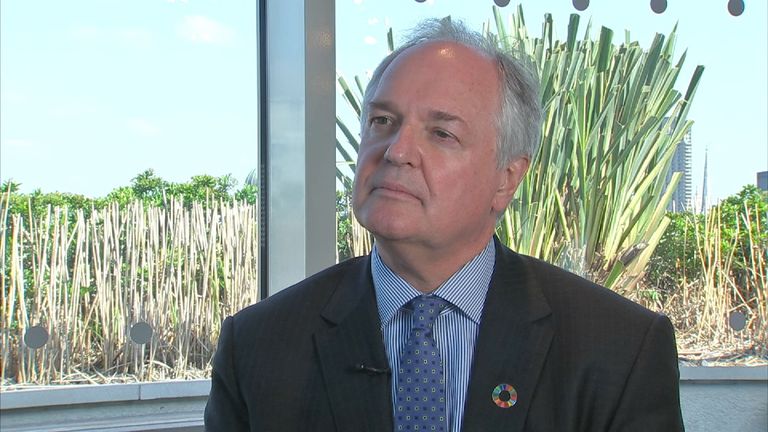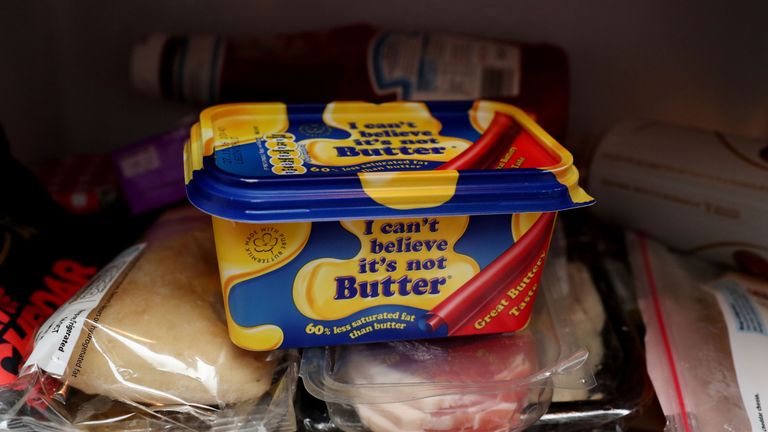The 'wake-up call' for Unilever's boss Paul Polman
Sky's Ian King ponders whether Unilever's renewed bid to drive shareholder value goes far enough for investors.
Thursday 6 April 2017 14:46, UK
The recent takeover approach from Kraft Heinz was a wake-up call for Unilever.
The Dove soap, Magnum ice cream and Persil giant was taken aback by the approach, which it saw off without too much difficulty, but it emerged from the episode convinced it must do more to keep shareholders happy.
Today, Paul Polman, the chief executive, fleshed out .
Most strikingly, Unilever will offload its spreads business, which includes household names like Stork and Flora.
It is stepping up cost savings and raising the sum it hopes to save during the next three years from €4bn to €6bn.
Mr Polman also promises €5bn worth of share buy-backs and is cranking up the dividend by 12%.
And, most dramatic of all, Unilever will also review the "dual listing" structure under which its two entities - the Dutch-based Unilever NV and UK-based Unilever plc enjoy separate legal entities and stock market listings.
These are big moves for a company like Unilever. For a start, Mr Polman has always set his face against share buy-backs, disparaging them as financial engineering.
And offloading the spreads business means parting with an activity that has always been at the heart of the company: Naamloze Vennootschap Margarine Unie, which dates back to 1872, was the Dutch business that helped create Unilever via its merger, in 1929, with the British soap maker Lever Brothers.
So it will be an emotional decision for a company that has always been proud of its heritage and its place in society.
With Mr Polman also aiming to raise profit margins to 20% by 2020, it also places pressure on other parts of Unilever to run faster, as the spreads business enjoys better margins than other parts of the business.
Probably the most far-reaching decision, though, is the review of the dual-listing structure. The last time Unilever looked at this was in 2005, shortly before Mr Polman became chief executive, when it concluded dropping the structure would have adverse tax consequences.
Now, it seems, Mr Polman has concluded the structure is potentially holding back Unilever from buying other assets. Rumour has it these could include the French's mustard brands recently put up for sale by Reckitt Benckiser, another Anglo-Dutch FTSE-100 stalwart.
The question is whether this shake-up goes as far as investors wanted. There had was speculation Mr Polman might completely split Unilever's food and drink business, which includes Marmite, PG Tips, Pot Noodle and Ben & Jerry's, from its household goods and personal care businesses, which include brands like Radox, Lynx, Domestos and Vaseline.
Some shareholders will argue Mr Polman ought to be more aggressive in the margins he is targeting.
Kraft Heinz, Unilever's erstwhile buyer, achieved margins of 27.2% last year, compared with 15.6% at Unilever, while it is aiming for 30% by next year - compared with Unilever's more pedestrian-looking 20% by 2020.
Yet the comparison is misleading. Kraft Heinz's assets are more basic than those owned by Unilever and have more in common with the latter's low-growth spreads business than they do with other brands in Unilever's kitchen cupboard.
Kraft Heinz grows its profits more from cutting costs aggressively than it does from using its imagination. It is impossible to imagine Kraft Heinz even inventing a world-leading brand like Magnum from scratch, as Unilever did in 1992, let alone coming up with the numerous different flavours, concepts, formats and other tweaks that have kept the brand fresh in the eyes of consumers.
That inventiveness is all about creating and sustaining brands for the long term - and requires rather more investment than the comparatively unsophisticated process of flogging cans of baked beans and packets of processed cheese.





